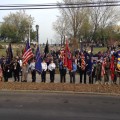Guest post submitted by Gonzalo Duran
 The misuse of time and energy wasted at legislation within the Mayor’s Office of Veteran Affairs (MOVA) continues to astonish me. The terse timeframe for the new Commissioner General, Loree Suttons’, statement that “She has not been on the job long enough”, does not sit well with me but nonetheless I look forwarded to hearing her assessment before the years end.
The misuse of time and energy wasted at legislation within the Mayor’s Office of Veteran Affairs (MOVA) continues to astonish me. The terse timeframe for the new Commissioner General, Loree Suttons’, statement that “She has not been on the job long enough”, does not sit well with me but nonetheless I look forwarded to hearing her assessment before the years end.
Personally I would have preferred former Commissioner Col. Holiday to stay at his position, and have these issues brought to him given proper funding to continue his longtime objectives. Although I did my best to show Col. Holiday the work we do could help, he was only able to see my point towards the end of his tenure. The time for this is gone, and now I have to request, and hope that the new Commissioner will review my work, and grab the parts, which I believe would benefit at MOVA’s level.
The New York City (NYC) Council on Veterans Committee meeting on September 29, 2014 and its introduction of 314 has many conflicts that bother me:
- Why become autonomous? Becoming its own separated entity will require more “assessments” and “restructuring”, in a department that is not able to “fully” function already. The major problem MOVA faces is funding. This action, I assume would give the NYC Council, and other entities the ability to allocate money discreetly (as they are known for) more freely from the Veteran’s community. The Veteran community faces many issues but the largest problem is that organizations tend to become Veteran friendly to reap the benefit of funds. For example: you are an organization devoted to housing the mentally ill and substance dependent individuals. You build one or two major complexes, then when it’s full, and want to build two or three more housing units you add a Veterans’ department section, and bam! Now you have access to millions of dollars and are able to bypass the red tape for many government-auditing agencies. I know this seems appealing to many of the members of the board but to make it clear, the Veteran’s community, Veteran’s families, the citizens of New York (your constituents), especially I am watching your ethical / moral standards. This principle can be added to many additional service programs on how they function.
- Counselors for mental health in every borough, how would MOVA or a separate department deal with this? There are Veteran Affairs Hospitals and Veteran Centers that provide these services already. Plus the medical universities and non-profit sectors cover many of these same programs. All of these programs are funded by taxpayers and tax contributions. If this office cannot handle, Veteran Disability Counselors, then how do they expect to run an all-borough counseling service? The programs in place are great but were it would affect the Veteran community the most is the flexibility of services. Working, and going to school or doing either one requires hours outside of the government’s 9-5 schedule. Those that are homeless or attending school have a better chance of these services but employed or those working on their independence through government-mandated observation, are cut off from these basic programs. Working with organizations on providing after hours or new concepts like phone counseling by registered personnel can go a long way. This same principle applies for housing, legal, medical and educational objectives.
- The VA Disability claim (VA Form 21-526) is only 10 pages, and 4 are instructional. It’s a simple document of basic information, dependency information, service information, and medical treatment. MOVA claims to have had 3 counselors funded by, The Robin Hood Foundation, at $250,000. Let us look at the true economical issue:
- Let us say the cost to teach this program was $15,000 on a 6-page document.
- Minus computers, software, and electricity for 1 year at $5,000.
- Divide the remainder for the 3 counselors at $76,666.66, if they were even paid that much.
- Let’s assume they were paid $30,000, which might be farfetched but it brings the total left at $140,000.
- Given the fact that they’re trained and the equipment is now in place why is this program needed or why is $250,000 needed to continue funding this program? There are dozens of programs, agencies, and organizations dedicated to helping Veterans complete this 6-page document. It has even been implemented online for convenience through the VA’s E-Benefits program. NYC has a 10-month average claims process with a two-year completion rate for many beneficiaries. This backlog is the issue but that is a Federal Veteran’s Affairs problem, not an NYC or State level issue.
- Employment opportunities? MOVA provides two great programs possible with the capacity they already have. Providing suits to Veterans, which I am honored to say, assisted me in my time of need also the network resources to seek out job opportunities. The rest is handled by other agencies such as the Labor Department. Where they could use help is, instead of throwing huge promotional job fairs; break them up into guaranteed job opportunities for specific fields, qualifications, and during periodic times. These simple adjustments will avoid huge lines for perspective employees faced with what they thought were interviews but are currently; go online and submit resume only fairs.
- Changing the name? Unfortunately, this might be their highest priority but I can assure you no one is confused. I am sure we all know that the office belongs to the Mayor’s Office in NYC and the Veteran Affairs means anything but Veterans issues and concerns. That’s if introduction 314 is postponed. My point is, there is something in place, why make a change to it before having a handle on the problems.
MOVA is a city organization, their power goes only so far, and that includes the Governor’s Office as well. My goal and, Devil Dog USA Inc.’s, goal is to bring all entities from the state, city, federal government, civilian, and nonprofits to work in a cohesive environment. Where we can stop the petty attention of recognition and greedy ways to solely focus on the Veterans and Veterans alone.
I would like to conclude with this statement, “MOVA can only do so much but it has a key ability to bring organizations together. Many of these organizations that would not associate in the same location because of sponsorship fears. Once MOVA becomes involved that pressure is relieved”.
Gonzalo Duran
Chief Executive Officer
Devil Dog USA Incorporated

















Follow Us